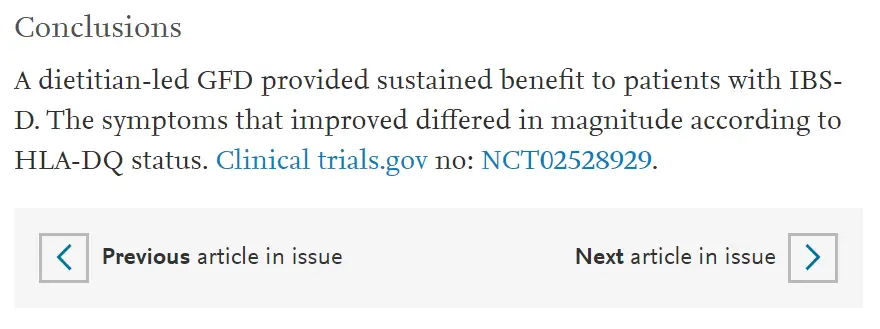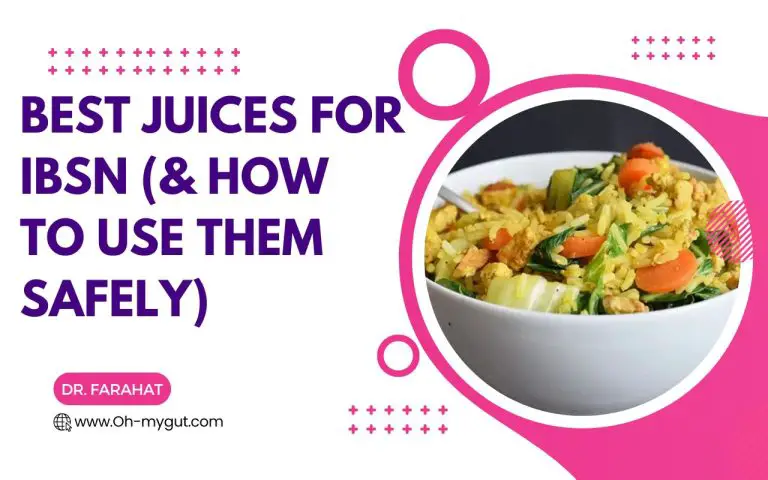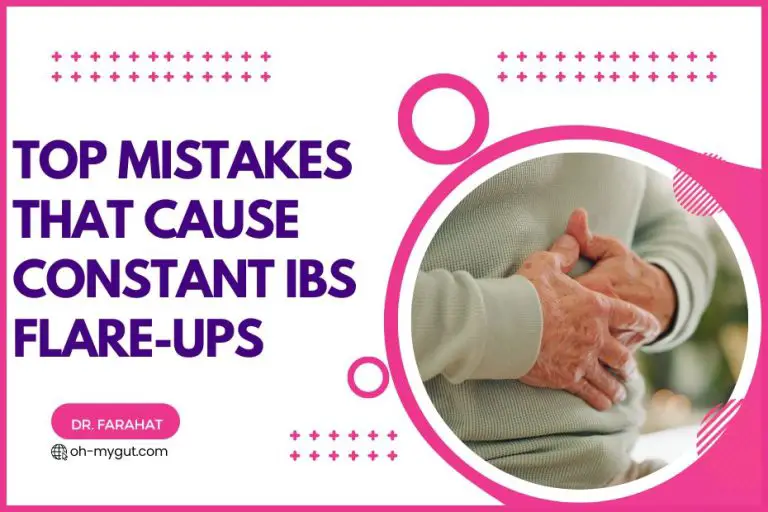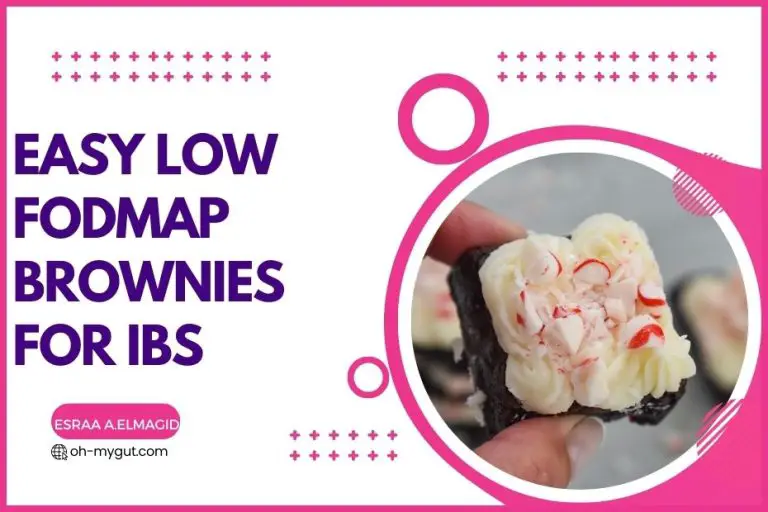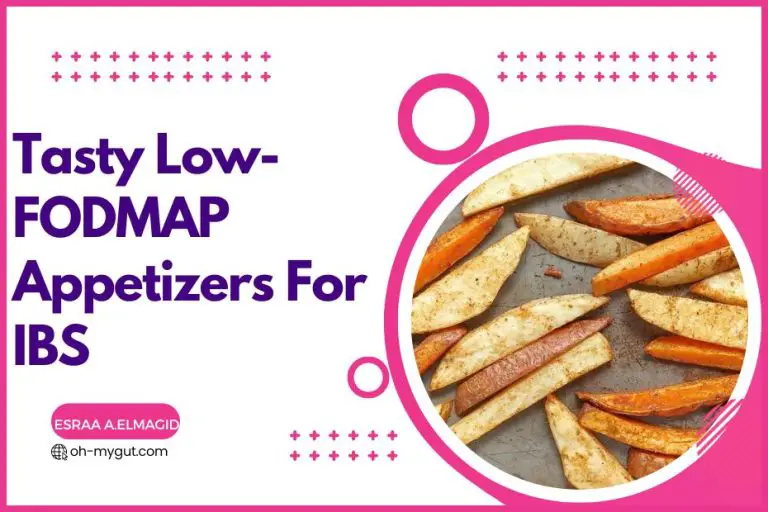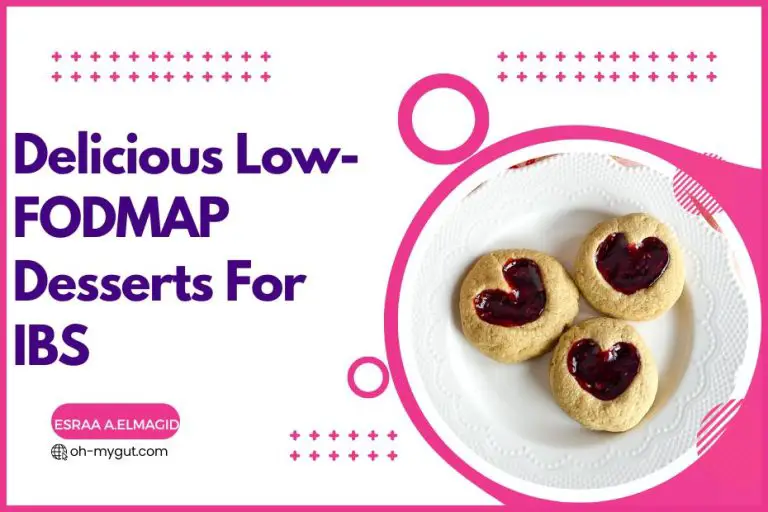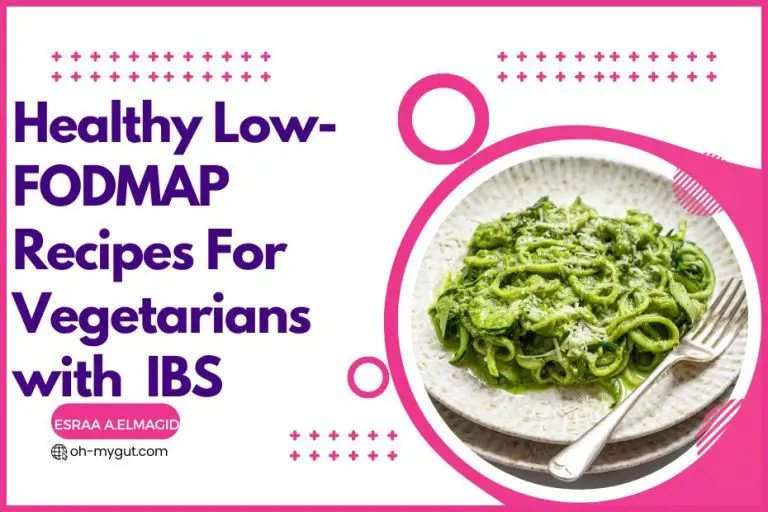How To Cure IBS In One Day (9 most effective strategies)
Our content is not intended nor recommended as a substitute for medical advice by your doctor. Use for informational purposes only.
Are you fed up with IBS? Looking for a miraculous solution that can cure IBS in a day? Completely?
The internet is brimming with tales of IBS patients who’ve found complete relief by avoiding certain foods or taking specific probiotics.
YES, it’s possible.
But sadly, it’s not the norm.
What works for one IBS patient might not work for you.
As an IBS doctor and patient, I regret that this magical cure doesn’t exist.
Research hasn’t pinpointed a specific cause for IBS, nor has it discovered a definitive cure.
So, if you’re keen to learn how to alleviate IBS in a day, you’ll need to read this thoroughly.
This is a comprehensive, evidence-based article about the most effective strategies that may help you relieve IBS in a day.
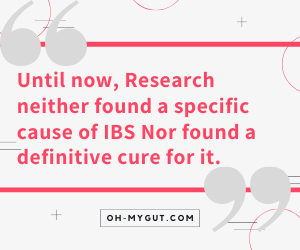
(1) Steer Clear of Gas-Inducing Foods and Habits
If you have IBS, your intestine is hypersensitive to gas. You may experience pain and distention even with normal amounts of gas in your gut.
I always advise my patients to avoid these foods if they’re experiencing bloating, gas, or abdominal pain:
- Beans, onions, celery, carrots, and raisins.
- Bananas, apricots, prunes, and Brussels sprouts.
- Wheat germ, pretzels, and bagels.
- Carbonated beverages.
- Caffeine in coffee and chocolate.
You may feel instant improvement by eliminating the above foods from your meals. Some IBS patients experience instant relief without any medication.
We normally swallow a certain amount of air when we eat. Certain habits can increase the amount of swallowed air, such as:
- Eating too quickly
- Smoking
- Chewing gum
- Being inactive after meals
I always encourage my patients to engage in physical activity after they eat. A 10-minute exercise or walk after your meal can alleviate distension and colic.
(2) Avoid FODMAP Foods and Fruits
FODMAP foods are a group of short-chain carbohydrates that are poorly absorbed in your intestine.
FODMAPs are known triggers for IBS. Research has shown that restricting these foods can significantly improve your symptoms.
FODMAP refers to Fermentable Oligo-, Di-, and Monosaccharides And Polyols.
- Fermentable: means that gut bacteria break them down, producing lots of gas.
- Oligosaccharides: Refers to compounds called fructans and galacto-saccharides present in wheat, barley, rye, onion, garlic, and legumes.
- Disaccharides: Refers to lactose sugar in milk, ice cream, custard, and yogurt.
- Monosaccharides: Refers to free fructose in apples, pears, mangoes, cherries, watermelon, asparagus, sugar snap peas, honey, and high-fructose corn syrup.
- And
- Polyols: They are substances called sorbitol, mannitol, xylitol, and maltitol, present in certain types of fruits like apples and watermelon and artificial sweeteners like artificially sweetened gum and alcohol.
So, learn how to alleviate IBS daily by checking your next meal for the FODMAP diet and avoiding the foods listed above.
Pro Tip: You don’t have to eliminate these foods from your diet completely. Instead, you can consume small to moderate amounts of a diet containing FODMAPs as much as you can tolerate. But during an attack, it’s better to avoid any FODMAPs completely.
(3) Consider Avoiding Gluten and Lactose
If you’re unsure which food exacerbates your IBS, try temporarily restricting gluten and lactose during an IBS attack.
Gluten is a known trigger of celiac disease, but it’s also associated with non-celiac gluten sensitivity. This means that you may have some intolerance to foods containing gluten even if you don’t have celiac disease.
Some studies have shown that people with IBS diarrhea can benefit from restricting gluten. This study on people with IBS-D revealed that a gluten-free diet may improve the frequency of diarrhea and intestinal immunity.
As for lactose, I also recommend avoiding dairy products like milk, ice cream, and yogurt during your IBS attack. (Remember, lactose is a FODMAP)
I know it’s a lot of food to avoid during an acute attack, but your discomfort is worth trying.
Even if you’re not lactose intolerant, you should try to avoid lactose during an IBS attack. Some research suggests that sensitivity to milk or milk products is not necessarily due to its lactose sugar component. Another component of milk, called cow milk protein, may cause your problems with dairy products. So even if you tested negative for lactose intolerance, you may still have problems with milk products.
(4) Be Cautious with Fiber—It’s a Double-Edged Sword
There are two main types of fiber:
-
Soluble fibers slow down the movement of your intestine and are present in apples, oranges (remember, apples are FODMAP), strawberries, blueberries, peas, oats, beans, bran, and barley. Soluble fibers dissolve in water and form a gel. If you have IBS diarrhea, soluble fibers are good for you.
-
Insoluble fibers don’t dissolve in water and, if eaten correctly, can help your gut with constipation. But eating larger amounts or increasing the amount too quickly can exacerbate your IBS. Insoluble fibers are present in whole grains, bran, leafy vegetables, brown rice, broccoli, and cabbage.
Both soluble and insoluble fibers are a double-edged sword. They can either harm or benefit your IBS, depending on the type and amount of fiber and the type of your IBS.
Eating too much fiber can worsen your IBS bloating and abdominal pain. On the other hand, eating the right amount and type of fiber can effectively alleviate your IBS in a day. I’ve thoroughly discussed this topic in my article “Fiber And IBS: 8 Interesting Facts You Didn’t Know”.
The most useful ways to consume fiber with IBS:
- Choose whole-grain bread and cereals instead of processed or refined foods.
- Choose whole fruits with peels, if possible, instead of fruit juices.
- Choose brown rice instead of white rice.
- Choose whole flour instead of refined flour.
- Try to increase the amount of fiber you eat gradually.
- Some dietary fibers contain FODMAPs like others or are gas-forming like cabbage—try to avoid them.
- If you cannot obtain the required amount in your diet, you can try to take IBS-friendly fiber supplements like psyllium.
(5) Change Your Eating Habits
Not only does the type of food you eat matter but how you eat it may also trigger your IBS.
Eating too quickly or while working or driving makes you swallow more air and not chew your food adequately. This can increase distension and exacerbate your IBS.
Also, irregular mealtimes and physical inactivity may trigger your IBS.
Best practice tips for eating with IBS:
- Try to eat as slowly as you can.
- Don’t eat while you’re working or driving.
- Eat at regular intervals—this predictable eating pattern makes your colon less likely to complain.
- Move after you eat; light exercise or a short walk will help your colon.
- Eat small, light meals and avoid large, heavy meals.
How to Alleviate IBS in a Day Using Over-the-Counter Drugs
The quickest and most effective way to instantly relieve your IBS symptoms is by using medications.
There are two types of medications:
- Prescription drugs: only your doctor can prescribe them, and you can’t get them yourself.
- Over-the-counter drugs are drugs with high safety profiles, and you can get them without a prescription.
Fortunately, a big part of IBS medications is available over the counter. But my advice to you is to consult your doctor about your symptoms. They will be able to prescribe the most suitable medication for your condition.
But if you can’t wait for your doctor, you can learn how to alleviate IBS daily using various over-the-counter drugs.
In the next section of this article, I will tell you exactly when and how to choose the most suitable over-the-counter medication for you. You can select the drug according to your most distressing symptoms:
- Abdominal pain attack
- Diarrhea-predominant IBS attack
- Constipation-predominant IBS attack
- Bloating and distention
Pro Tip: You can combine more than ONE medication if you have more than one symptom.
EXAMPLE: You can take medication for abdominal pain and another for diarrhea (if you have both abdominal pain and diarrhea).
(6) Over-the-Counter Drugs for IBS Pain Relief
Option 1: Peppermint Oil
Peppermint oil is one of the most widely used over-the-counter drugs for IBS.
It’s also known for its good safety profile. Pharmacists believe that the soothing effects of peppermint oil are due to a substance called menthol.
How Peppermint Oil Works for IBS
- It decreases the contractions of the smooth muscles of the colon, thus decreasing your abdominal pain.
- It regulates the motility of your gut, which is specifically beneficial in IBS diarrhea.
- It also helps to reduce IBS gas and bloating.
When to Take Peppermint Oil
Many clinical trials have studied the antispasmodic effects of peppermint oil. Most concluded that menthol could be used as a first-line therapy for abdominal pain due to its efficacy and safety over other prescription antispasmodics.
You can use peppermint oil for:
- IBS abdominal pain
- IBS gas and bloating
- IBS diarrhea
- Also, with mild constipation
How to Take Peppermint Oil
- Enteric-coated capsules are better, as they bypass your stomach and cause fewer side effects.
- The usual dose of enteric-coated capsules is 1 or 2 capsules three times daily.
- I usually prescribe peppermint oil as the first choice for relieving IBS abdominal pain, even before the famous prescription antispasmodic drugs.
- Peppermint oil is used for short-term periods. Please consult your doctor if you plan to use it for over a month.
Peppermint Oil Side Effects
- Usually minimal and only appear in larger doses.
- The most common side effect is heartburn. The peppermint oil capsule form protects your stomach from this side effect.
- Others (rare): allergic reactions, headache, burning anal pain.
More Information About Peppermint Oil for IBS
WebMD peppermint oil drug information
A review study about peppermint oil for IBS.
Option 2: Buscopan IBS Relief
Buscopan IBS Relief, also known as Hyoscine Butyl bromide, is my second drug of choice for relieving pain associated with IBS.
First discovered in Germany in the 1950s, Buscopan is widely used as an antispasmodic to relieve abdominal colic. It is available over the counter in many countries, including the United States.
Here are some key points to consider before deciding to take this drug:
- How Buscopan works
- Why and when should you take Buscopan
- How to take the drug
- When you shouldn’t take Buscopan
- The possible side effects
How Buscopan Works
IBS pain results from involuntary contractions of the muscles in the wall of your intestine. These contractions can be triggered by certain foods or excess gas inside your intestine, causing your smooth muscle to contract and result in pain.
Buscopan works by inhibiting these smooth muscle contractions in your intestine, which relaxes your colon walls and relieves pain and colic. Although not widely prescribed in the United States, it is available as an over-the-counter drug on Amazon.com. The tablet form is generally safe as only a small fraction is absorbed into your bloodstream.
Why and When You Should Take Buscopan
Consider taking Buscopan when your IBS abdominal pain cannot be controlled by diet alone or when you need instant pain relief for your IBS.
How to Take the Drug
- Start with one tablet three times per day.
- The dose can be gradually increased to 2 tablets four times daily (although I don’t recommend this).
- The tablet should be taken whole with a glass of water.
- It can be taken with or without food, but I recommend taking it 15 minutes before your meal.
- Do not take the drug for longer than 14 days.
- It is always better to consult your doctor before taking Buscopan.
The Possible Side Effects of Buscopan
Generally, the tablet form is safer than the injection form as it is poorly absorbed from your intestine to your bloodstream, resulting in fewer side effects. These side effects include:
- Less than 1%: Awareness of heartbeats (palpitation or tachycardia), dry mouth, blurred vision, and mild skin reactions like hives or itching.
- Less than 1 per 1000: Difficulty passing urine.
- Extremely rare: Allergic reaction to hyoscine butylbromide.
When You Shouldn’t Take Buscopan
- If you don’t have medically confirmed IBS.
- If you experience abnormal symptoms with IBS like vomiting, fever, or passage of bloody stools.
- If you have glaucoma.
- It’s better to be avoided during pregnancy and lactation.
- If you have severe constipation.
- If you have a condition called benign prostatic hypertrophy.
- If you are taking antipsychotic or anti-Parkinson medications.
- If you are taking other antispasmodics or antihistamine drugs.
- If you are under 12 years old.
- If you have a medical condition called megacolon.
For more information, check these resources:
- Drugs.com Buscopan IBS relief
- Buscopan IBS relief (hyoscine butylbromide)
Probiotics also play a vital role in relieving IBS pain. I’ve discussed probiotics in a separate section below.
(7) Over-the-Counter Drugs for IBS-Diarrhea: Imodium
Loperamide, or Imodium, is a safe and commonly used drug for diarrhea, particularly for those with IBS-predominant diarrhea.
How Imodium Works
- It decreases the movement of your intestines, thus slowing down the passage of contents.
- It increases the absorption of fluid and nutrients from your intestine into the blood.
- It prevents the secretion of fluids into your intestinal lumen, thus preventing the formation of loose stools.
When to Take Imodium
You can take Imodium if you have IBS diarrhea with or without abdominal pain. Imodium is also beneficial if you have a mixed type of IBS with constipation alternating with diarrhea.
When Not to Take Imodium
- If you have IBS constipation.
- It’s better not to use Buscopan IBS relief.
- Suppose your diarrhea is not due to IBS (diarrhea not associated with food, awakens you at night, or is associated with fever). It is better to consult your doctor.
- If you have IBS pain without diarrhea.
- If you have dysentery, inflammatory bowel syndrome, or a condition called membranous colitis.
Imodium Dose and How to Take
According to this study, the required dose is usually 2 to 4 milligrams (mg) daily for IBS diarrhea. The maximum daily dose for adults is 16 mg, but I recommend you never exceed 8 mg per day. Each tablet of Imodium contains 2 mg loperamide, and is taken once daily. You can increase the dose gradually to 4 or 6 milligrams a day until the diarrhea stops.
Imodium Side Effects
The side effects are usually rare, making the drug generally safe. They include:
- Constipation, especially with higher doses.
- Some nausea, dizziness, and abdominal cramps.
For more information about Imodium, check these resources:
(8) Over-the-Counter Drugs for IBS Constipation
Option 1: Psyllium Fibers (Metamucil)
Psyllium is a soluble fiber used mainly to treat constipation. It also reduces your blood sugar, cholesterol, and blood pressure. New evidence has suggested that a trial of psyllium can benefit people with IBS constipation. Psyllium has no benefit with IBS-diarrhea nor the mixed type of IBS.
How to Take Psyllium (Metamucil)
- Start with a low dose of 5 gm of psyllium powder thrice daily.
- It should be taken with a large amount of water, at least 200 CCs of water.
- It can be taken with or without food.
- You can increase the dose gradually the next day if constipation persists (for example, 10 grams thrice daily).
Option 2: Polyethylene Glycol
Polyethylene glycol is an osmotic laxative, meaning it retains water within your stool, making it softer and easier to pass. This randomized controlled trial showed that polyethylene glycol can help eliminate constipation associated with irritable bowel syndrome.
How to Take Polyethylene Glycol
- It is available in powder and fluid forms.
- It is taken with a large amount of water.
- Polyethylene glycol is taken once daily.
- Take the same amount in the prescription leaflet, no more or less.
When Not to Take Polyethylene Glycol
- If you are a pregnant female
- If you have severe bloating and distension
- If you have any medical conditions other than irritable bowel syndrome (consult your doctor first)
- Do not take it for more than two weeks unless prescribed
Check WebMD Miralax information for more details.
(9) Probiotics for IBS
How Probiotics Work
Your gut is teeming with normal bacteria that live inside it. You provide them with a place to live and food to eat, and they help your gut digest food and fight other unwanted organisms.
One of the most accepted theories of IBS is the imbalance between the good bacteria (normal intestinal flora) and the bad bacteria. This imbalance can lead to the appearance of IBS symptoms such as abdominal pain, bloating, diarrhea, or constipation.
Probiotic supplements are essentially “good bacteria.” They can help your gut regain its balance and function. We are now in the probiotic era of IBS treatment. While research around different probiotic strains is still inadequate, there is growing evidence that certain probiotic strains and combinations are effective in some IBS patients.
Probiotics are extremely safe, which is why doctors are comfortable prescribing them.
The Best Probiotics to Try
Probiotics are available in many forms (capsule supplements, probiotic yogurt, probiotic milk). Unfortunately, no standard dosing, duration, and strains fit all IBS patients.
All we know is that probiotics containing “Bifidobacteria” and combinations of multiple strains have better results. Still, there remains a lot to be studied about the perfect types, dosing, and duration.
The standard rules for taking probiotics are:
- Only choose probiotics containing strains that research has proved its efficacy.
- Take probiotics that contain combinations of different strains in full doses.
- Adhere to one type of probiotic for 3 to 4 weeks. If there is no improvement, you can shift to another type (trial and error).
- Only choose established brands from a quality manufacturer.
FAQs:
How to relieve IBS pain Immediately?
Immediate relief from IBS pain can often be achieved through lifestyle changes and medication. Over-the-counter antispasmodic medications like Buscopan can help relax the muscles in your gut, reducing pain and discomfort. Heat therapy, such as a hot water bottle or a heating pad applied to the abdomen, can also help soothe cramping and pain.
How can I calm down IBS naturally?
Natural remedies for IBS often involve dietary and lifestyle changes. Regular exercise, adequate hydration, and a balanced diet rich in fiber can help manage IBS symptoms. Avoiding trigger foods like caffeine, alcohol, and certain high-fat or spicy foods can also help. Stress management techniques such as meditation, yoga, and deep-breathing exercises can also be beneficial, as stress can exacerbate IBS symptoms.
What is the best over-the-counter medicine for IBS pain?
The best over-the-counter medicine for IBS pain depends on the individual and their symptoms. Antispasmodics like Buscopan can help with abdominal pain and cramping. Loperamide (Imodium) can help control diarrhea, while fiber supplements like psyllium (Metamucil) can help with constipation. Always consult with a healthcare provider before starting any new medication.
How to relieve IBS diarrhea quickly?
Over-the-counter anti-diarrheal medications like Imodium can provide quick relief from IBS-related diarrhea. Staying hydrated is also important by drinking plenty of fluids, preferably water or other clear liquids. Avoiding trigger foods and eating smaller, more frequent meals can help manage symptoms.
How to relieve IBS constipation overnight?
Over-the-counter laxatives like polyethylene glycol can be effective for quick relief from IBS-related constipation. Increasing dietary fiber intake through foods or supplements like psyllium (Metamucil) can also help. Drinking plenty of water and engaging in regular physical activity can promote bowel regularity. If symptoms persist, it’s important to consult with a healthcare provider.
- Evidence-based
- Written by a doctor.

Related Posts:
- 9 Effective Ways to Stop Hiccups Instantly at Home.
- 7 Effective Hiatal Hernia Pain Relief Tips: Doctor Explains.
- 14-Day Low-Cholesterol Meal Plan To Save Your Heart
- Easy 5-Day Low-Fiber Diet Plan For Colon Prep
- 17+ Delicious Breakfast Ideas For IBS-Constipation.
- 9 Best Juices For IBS (& How to Drink Them Safely)
